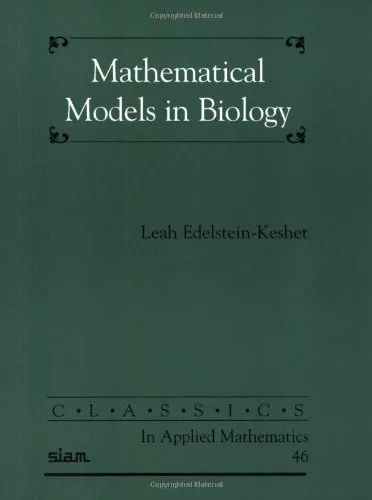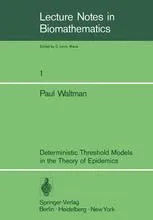Mathematical Models in Biology
4.6
Reviews from our users

You Can Ask your questions from this book's AI after Login
Each download or ask from book AI costs 2 points. To earn more free points, please visit the Points Guide Page and complete some valuable actions.Related Refrences:
Introduction to "Mathematical Models in Biology"
Welcome to the world of mathematical biology, a fascinating field where mathematical theories and techniques are applied to understand and model biological phenomena. Mathematical Models in Biology, authored by Leah Edelstein-Keshet, serves as a cornerstone resource for students, researchers, and professionals looking to delve into this interdisciplinary domain. This book offers a comprehensive introduction to mathematical modeling in the life sciences, bridging complex biological processes with elegant mathematical frameworks.
Detailed Summary of the Book
The book is a well-crafted synthesis of mathematical rigor and biological relevance. It provides an in-depth exploration of topics such as population dynamics, enzymatic reactions, epidemiology, and stochastic processes, among others. The first part of the book introduces fundamental mathematical tools, such as ordinary and partial differential equations, phase plane analysis, and stability theory.
As the reader progresses through the text, the applications to biology become increasingly multifaceted. The book transitions naturally from simple linear systems to complex nonlinear interactions found in ecology, physiology, and more. At the heart of the text lies a commitment to demonstrating how models are formulated, analyzed, and interpreted within a biological context. Examples include predator-prey population models, neural activity dynamics, and spatial spread of organisms.
Thanks to its balance of theoretical depth and practical application, this book is equally at home in advanced undergraduate classrooms and as a reference for seasoned researchers. Its focus on clarity ensures that readers from diverse backgrounds—be it biology, mathematics, or engineering—can grasp the core principles of mathematical modeling in biology.
Key Takeaways
- Insights into how mathematical tools can be applied to model and understand biological phenomena.
- A clear exposition of both deterministic and stochastic modeling techniques.
- Practical examples that bridge theoretical equations with biological applications.
- Guidance on interpreting and validating mathematical models in real-world scenarios.
- A solid foundation in nonlinear systems, stability analysis, and more advanced topics.
Famous Quotes from the Book
"Mathematical modeling is much more than just solving equations; it is a process of interrogating nature with mathematics as our language."
"Biology is a science full of complexity, yet it is through the construction of models that we distill and understand its essence."
"Every model is incomplete, but it is this incompleteness that challenges us to refine our understanding of the living world."
Why This Book Matters
In a world increasingly reliant on data-driven approaches, mathematical models have become indispensable tools in biology. This book holds a unique position in the field as it bridges the gap between abstract mathematics and real-world biological problems. By providing a methodological framework for modeling biological processes, it equips readers with the ability to answer critical questions in domains such as ecology, medicine, and biotechnology.
Whether you are studying the spread of a disease, predicting the growth of a cancerous tumor, or exploring the migration of species across continents, Mathematical Models in Biology provides the tools needed to tackle these challenges. Furthermore, its accessible writing style and clear derivation of equations make it an enduring resource for anyone interested in the synthesis of mathematics and biology.
The book also instills an important philosophical point: that mathematical models are not just tools for prediction but also pathways to deeper insight. They allow us to analyze what is known, predict what is unknown, and refine our understanding of the natural world in profound ways.
Free Direct Download
You Can Download this book after Login
Accessing books through legal platforms and public libraries not only supports the rights of authors and publishers but also contributes to the sustainability of reading culture. Before downloading, please take a moment to consider these options.
Find this book on other platforms:
WorldCat helps you find books in libraries worldwide.
See ratings, reviews, and discussions on Goodreads.
Find and buy rare or used books on AbeBooks.
1379
بازدید4.6
امتیاز50
نظر98%
رضایتReviews:
4.6
Based on 0 users review
"کیفیت چاپ عالی بود، خیلی راضیام"



